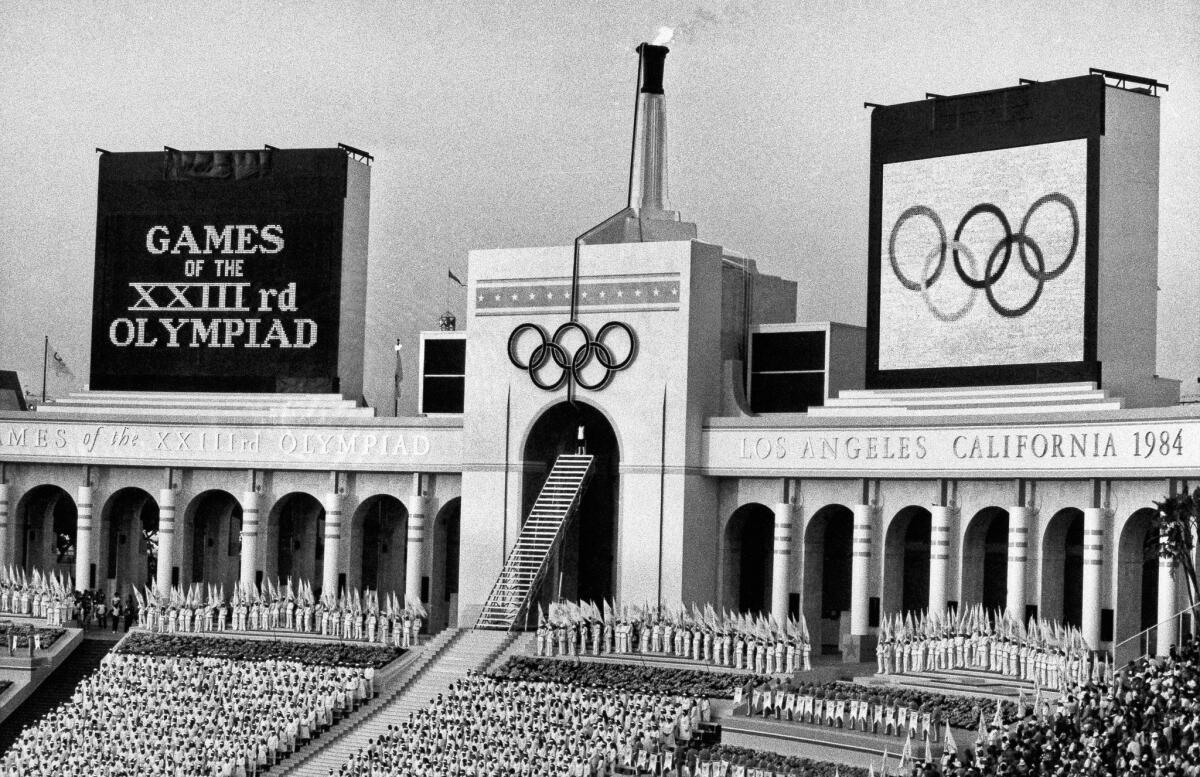A surplus of $161 million is projected for L.A.’s 2024 Olympics bid

The Coliseum is shown during the 1984 Olympics.
- Share via
The plan to bring the Olympics back to Los Angeles for a third time has become a little clearer with city officials offering additional details about how they would stage the massive sporting event.
Their $4.1-billion bid proposal for the 2024 Summer Games — contained in a 218-page book made public Tuesday — shows they expect private-sector partners to pay more than $1.7 billion in additional venue costs.
The proposal also contains more detailed revenue projections, with an estimated $4.8 billion from ticket sales, broadcast rights and corporate sponsorships generating a $161-million surplus.
“I think they have put together a pretty interesting plan,” said Andrew Zimbalist, an economics professor at Smith College in Massachusetts who studies the business of the Games. “There are still a lot of questions.”
The campaign for 2024 begins in mid-September, the deadline for submissions to the International Olympic Committee. Los Angeles is expected to be the U.S. candidate, stepping in for the original choice, Boston, which withdrew amid cost concerns.
The host city will be chosen in 2017. Paris and Rome are considered the main competition for final selection.
Mayor Eric Garcetti had previously given limited information about the bid, but with the Los Angeles City Council considering the matter this week, sports executive Casey Wasserman — who has worked closely with Garcetti — posted a link to the proposal on Twitter.
“This is the first draft,” said Jeff Millman, a former mayor’s aide is now focusing on the bid project. “If Los Angeles is selected by the USOC, it will evolve in the months and years ahead.”
A private organizing committee would take over for Garcetti’s office and would rely on existing venues — such as Staples Center, StubHub Center and the Forum — to cut costs. The Coliseum would serve as a centerpiece, much as it did when the Games were here in 1932 and 1984.
The proposal lists a relatively economical $300 million for Coliseum updates, stating that USC, which leases the stadium, will have already begun a $500-million overhaul. University administrators have said little about their plans.
“USC is currently studying potential renovations of the Coliseum but no decisions have yet been made as to the scope and cost of those renovations,” Todd Dickey, a senior vice president, said on Tuesday.
The organizing committee would seek similar partnerships for the only two major venues that need to be built from scratch.
According to initial plans, a private developer would pay $925 million of the estimated $1 billion required to construct an athlete’s village on the site of the L.A. Transportation Center, a plot of land along the L.A. River that belongs to the Union Pacific Railroad.
The development would be converted into market rate and affordable housing after the Games.
A media center would be located on the NBCUniversal lot. The bid does not show an estimated cost but has the studio picking up all but $130 million of that expense.
Partnerships can be risky. Before the 2010 Vancouver Olympics and the 2012 London Olympics, private developers ran into financial difficulties, forcing the governments to spend hundreds of millions to finish the villages.
In Vancouver’s case, it took officials years to recover their money by selling the housing as condominiums.
“These things can work,” said Victor Matheson, an economics professor at the College of the Holy Cross in Massachusetts. “But if it was such a great deal for private investors, why wasn’t it built before?”
The bid anticipates $150 million in insurance premiums and includes a $400-million contingency fund, a nod to the fact that every Olympics since 1960 — even the profitable ones — have experienced cost overruns.
The IOC has traditionally required host cities to act as a financial backstop should unforeseen expenses exceed revenues. Montreal and Athens suffered large debts in 1976 and 2004, respectively.
Garcetti has vowed to sign the host contract, but needs authorization from the City Council. The mayor has insisted no public money would be necessary because of the projected surplus.
According to the bid book his office produced last winter and updated this week, organizers expect to receive a $1.5-billion share of the IOC’s television and sponsorship revenues.
That equals the amount the IOC will give to the 2016 Rio de Janeiro Games next summer. Experts say the share could actually be larger by 2024.
Among other major revenue streams, the Los Angeles bid predicts $1.4 billion from domestic sponsorships and $1.1 billion from ticket sales.
The revenue projections look reasonable to Zimbalist but the professor warned that, even with a sound plan, a lot can change in nine years.
“I think the vulnerabilities are on the cost side,” he said. “There are always risks.”
MORE ON OLYMPICS:
Top Garcetti aide leaves City Hall to campaign for L.A. 2024 Olympic bid
L.A. City Council to vote soon on authorizing 2024 Olympic bid
What did L.A. get from the ’84 Games? An Olympic-size boost for kids
More to Read
Go beyond the scoreboard
Get the latest on L.A.'s teams in the daily Sports Report newsletter.
You may occasionally receive promotional content from the Los Angeles Times.











